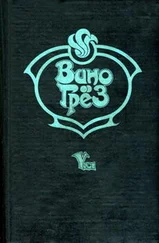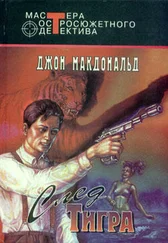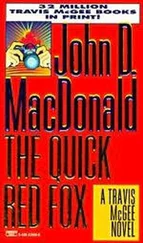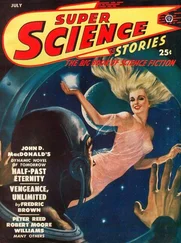John D. MacDonald
Area of Suspicion
To the memory of
Joseph Thompson Shaw

Dedication
Chapter 1
Chapter 2
Chapter 17
About the Author
I woke with the feeling of disorientation an unfamiliar bed gives you, woke in a room too small, and too still. It took long seconds to remember this was George Tarleson’s cruiser, the “Vunderbar,” to remember I had borrowed it yesterday noon, Saturday noon, telling George I had fishing on my mind. Actually my motive had been to get away from the Tarleson’s usual noisy week-end house party.
My bachelor beach cottage is a few hundred yards from their big house at Indian Rocks Beach. It is a good little party house, and when I bought it four years ago, I wanted the gay life — and got it. The cottage was the setting for a party that lasted one year. The personnel changed, but the party went on. For the next two years the parties were shorter, but just as loud. I endured them. During this past year, my fourth in Florida, I tried to escape whenever possible.
So yesterday noon I had borrowed the cabin cruiser from George, and cast off just in time to avoid the unwanted company of a brown and Bikinied maiden who had decided it would be jolly to shanghai herself. She stood in pigeon-toed wistfulness on the dock and watched me out of sight.
I trolled north, glad to be alone, and at dusk I found a secluded, mangrove-bordered bay near Dunedin Isles and dropped the hook far enough from shore to avoid the bugs.
So this was an April Sunday and I had slept long and well. I pulled on swimming trunks and padded out onto the deck. The day was still and gray and silver. Mullet leaped and ripples circles outward. The water was clear and deep. I balanced on the stern rail and dived, and the water washed away the last mistiness of long hard sleep. I swam straight and fast until I was winded, then rolled and floated. The “Vunderbar” was a blue and white toy resting on a display window mirror. This year I was sun-darkened, as during other years, to the shade of waxed mahogany, hair and eyebrows bleached lighter than my skin. But during other years it had been a veneer of health over a permanent condition of either hang-over or a fine high edge. I was back in shape, a testimonial to the abuse the human body will take without permanent damage, and being in shape again was a minor satisfaction which, more and more often, was balanced against vague, unwelcome stirrings of discontent.
Midge and George Tarleson had thrown the standard party. My group, I suppose, making a busy project out of idleness, giving dedicated attention to a new terrace, or a trip to Nassau, or non-objective art — junior grade — or a meaningless affair. When I felt superior or contemptuous, I told myself all my own little make-work projects in the area were also just so much window-trimming. There was no need for me to do anything except play. I had my inheritance — my nice bundle of eight thousand shares of Dean Products stock, the family enterprise. And every year the dividend was just about eight dollars a share.
It had been the usual party and Midge Tarleson had tried to pair me off with somebody whose motives were not as transient as my wariness likes to have them. She had been pretty enough, but she wore a lost look, and her prettiness was something she wanted to trade for security.
Once I had told Midge Tarleson just enough of my emotional history to give her a yen to cure me. She thinks marriage is a cure. But, to her exasperation, my playmates are the little sun-tanned beach girls who want to keep all alliances informal. I want no lost-looking ones.
Mine was the Great American Dream achieved. Money and idleness. But with it had come a sense of guilt, as though I were accused of some unspecified crime. And I guessed that my playmates, when they were alone, felt the same way. Hence our perpetual and turbulent parties. It was as though we had all begun to have a faint aroma of decay. The world was spinning toward some unthinkable destination, and we sat in the sand with our buckets and castles.
In spite of the restlessness it caused, it was better to be alone — a condition I was arranging with increasing regularity. Alone where gulls teetered on the wind, and made bawdy shouting, and the stingarees leaped high and came down with hard clap of gristled wings against the water.
As I swam back to the “Vunderbar” I heard a gutty droning. I looked south down the channel and saw a speedboat swing gracefully around the channel marker. I hauled myself up over the stern of the “Vunderbar,” shaded my eyes against the sky’s pale glare and recognized Jigger Kelsey’s hot little sixteen feet of mahogany hull with its one hundred horses. Jigger was behind the wheel with two women sitting near him. One of them waved and I recognized Midge.
For a moment I had a quick, inward twisting of alarm, an almost superstitious certainty that something had gone very wrong. But it faded quickly. I had left the party, so here was Midge bringing me a piece of it so that I wouldn’t be lonely. There would be a shaker of rum sours aboard, and an account of the fun I was missing.
Jigger made a sweeping turn and came alongside, reversing the motor, judging the distance nicely. He stood up and caught the rail of the “Vunderbar.” “You’re a tough guy to find, Gev,” he said, his grin white in the tan face. “Don’t you ever use that ship-to-shore?”
I tried to give the imitation of a man welcoming friends. The girl in the middle was the one with the lost gray eyes. But she looked at me quite absently and resumed her silent study of Jigger’s broad brown shoulders.
“How did you find me?”
“I sent out a general call,” Midge said, “and one of the charter boats reported seeing the “Vunderbar” at anchor up here.”
I frowned at Midge. “General call?”
She climbed deftly over the rail, ignoring my outstretched hand. Midge is a tall, thin woman with dusty black hair and a pallor the sun never changes. She always looks incongruous in casual beach clothes.
“Thanks loads, Jigger,” she said. Jigger gave a mock salute and shoved off and dropped into the seat. His boat was planing before it had gone twenty yards. The girl sat very close to Jigger. The bow wave sparkled, the drone faded out of the morning, leaving a white wake in a long curve around the channel marker.
“What’s up, Midge?” I gave her a cigarette. “George want the boat back?”
“No. But it was very anti-social of you to take off like this. You act like a hermit lately, Gev.”
“So you came out to tell me that?”
She sat in a fishing chair, hiked one knee up and hugged it. “Oh, not just for that.”
“This is your woman-of-mystery mood.” I made my tone light and casual. I knew Midge well. I knew that the more interesting the news, the longer it would take her to get to it. It all tied in with the twist of fear I had felt when I saw Jigger’s boat.
I thought about Ken, my brother, and felt the guilt in me again. Not the old guilt of having run out on him years ago, but a new guilt. His previous letters to me had been reserved, cool. But there had been recent ones. Odd letters. Full of vague hints of trouble, oblique statements about the plant, about his wife. Yet nothing definite or positive.
And there was another odd thing about his letters. They now rambled on about old days, old times, long before our trouble. Like the time at the lake we went searching for the lost Harrison girl and became lost ourselves. It was odd for him to bring up those old days, as though he were trying to recreate the warmth between us. I could try to deny that warmth, but it was still there. That sort of thing can’t really be killed.
Читать дальше
![Джон Макдональд Area of Suspicion [= My Brother’s Widow] обложка книги](/books/430260/dzhon-makdonald-area-of-suspicion-my-brother-s-cover.webp)









![Джон Макдональд - Wine of the Dreamers [= Planet of the Dreamers]](/books/430039/dzhon-makdonald-wine-of-the-dreamers-planet-of-thumb.webp)
![Джон Макдональд - Finding Anne Farley [= Ring My Love with Diamonds]](/books/430180/dzhon-makdonald-finding-anne-farley-ring-my-lov-thumb.webp)

